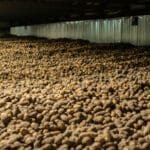Infestation of potatoes by the potato cyst nematode (PCN), a pest ravaging potato plants that was discovered in Kenya two years ago, has reached alarming levels.
A survey done in 20 counties through support from United Nations Food and Agricultural Organization (FAO), whose results were released two weeks ago, shows that PCN infestation has reached 80 per cent to 100 per cent in some of the potato growing areas.
The study shows the future of potato production in Kenya is bleak unless the government takes emergency measures to stem the rapid spread of the devastating pest.
PCN is classified as a quarantine pest by FAO, meaning that in countries where it is detected, tough restrictions are imposed. This includes bans on potato production and transport to other growing regions and even countries to stop the spread. The pest can remain in the soil for up to 30 years.
Infested potatoes usually show early maturity, produce tiny tubers and are usually stunted. Up to now, there is no known chemical or biological agent that can control the pest.
Nyandarua County leads with a prevalence rate of 91 per cent, followed by Elgeyo-Marakwet County (87 per cent), Nakuru County (88 per cent) and Narok County (88 per cent). Trans-Nzoia County, West Pokot County and Taita Taveta County, all have 100 per cent infestation, however, these counties are not major potato producers.
Of the 1,200 potato growing farms sampled in the survey, only four that produce seeds were found to be free of the pest.
Importation of whole potato tubers into the country has been blamed for the introduction of the pest. The Kenya Plant Health Inspectorate Service (Kephis) is supposed to ensure that any potato seed brought in has to be in the form of in-vitro plantlets that are quarantined at its station in Muguga. There, they are tested for pests and diseases before being put into experimentation plots for trials and eventual release as seeds, as stipulated under the Seed and Plant Varieties Act Cap 325. However, the Ministry of Agriculture has at times gone around this requirement and allowed imports of potatoes from the Netherlands and other European countries into citing potato seed shortage.
Potato, the second most important crop in Kenya after maize, is grown by more than 800,000 farmers.
Source: Potato Pro










